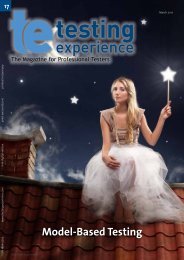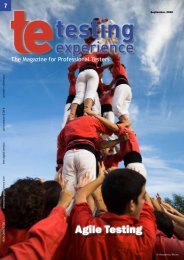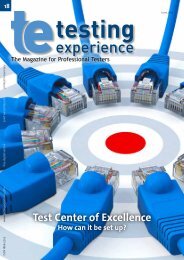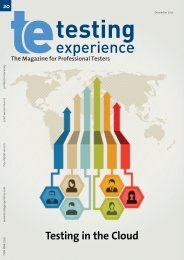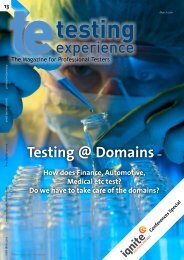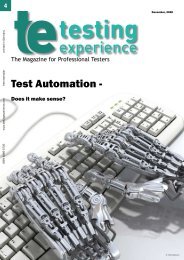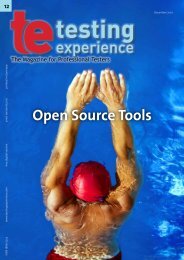Agile Performance Testing - Testing Experience
Agile Performance Testing - Testing Experience
Agile Performance Testing - Testing Experience
You also want an ePaper? Increase the reach of your titles
YUMPU automatically turns print PDFs into web optimized ePapers that Google loves.
Two perspectives. Non conformities<br />
Static assessments<br />
(document generated)<br />
Number of<br />
testers<br />
23 4<br />
Functional testing 12 11<br />
Environment testing 16 11<br />
Usability testing 15 11<br />
Volume testing 5 3<br />
Load and stress <strong>Testing</strong> 9 4<br />
Evaluation goals and Contents 4 3<br />
Evaluation strategy and process<br />
of learning.<br />
13 3<br />
Evaluation of materials used<br />
Evaluations of student development.<br />
10 3<br />
Evaluations of the tutor. 8 3<br />
Here are some of the non-conformities identified during the evaluation<br />
process for different types of testing:<br />
Static assessments: (documentation generated in the system)<br />
1. Format errors according to the rules of the templates proposed.<br />
Functional tests:<br />
1. Some of the features described in the requirements that<br />
were agreed with the client are missing and sometimes were<br />
poorly implemented.<br />
2. When data are inserted into the system detected a problem<br />
with validation.<br />
<strong>Testing</strong> environment:<br />
1. Used terms and abbreviations that are not previously defined.<br />
2. The link did not work properly.<br />
Evaluation of training materials:<br />
1. There were different types of resources and, there are only<br />
images.<br />
Biography<br />
Delvis Echeverría Perez<br />
27 years old, Engineer in Informatics Science, graduated in<br />
2007 from the University Informatics Sciences (UCI) in Havana,<br />
Cuba. He is currently a Quality Specialist in the software<br />
testing department of Calisoft, where he leads the sub-group<br />
Automated Tools for Software <strong>Testing</strong> Professor at the UCI. He<br />
worked as assistant manager of development and quality assurance<br />
in software development projects. He has participated in<br />
Release and Acceptance <strong>Testing</strong> of Software, both in Cuba and<br />
abroad.<br />
Assessments of the tutor:<br />
1. Not all tutors have extensive experience as online tutors.<br />
2. The program provides students throughout the course of the<br />
existence of technical mentoring for troubleshooting.<br />
Strategy assessment and learning process:<br />
1. The complexity of the tasks is not appropriate to the content<br />
and in relation to teaching skills of students.<br />
2. Not sought at any time by students who value the work done<br />
by the tutors.<br />
Conclusions<br />
The rapid and expansive growth of e-learning requires research<br />
on the impact of this new educational and technological alternative.<br />
Currently for the evaluation of e-learning systems many<br />
people follow the trend of putting pedagogy over technology. The<br />
union of the quality of the product with the quality of testing education,<br />
removes the tendency to evaluate separately the aspects<br />
of technology and pedagogy. If educational and technological objectives<br />
of a system do not match with the expected results, the<br />
system is not usable and leads to failure. The proposal has identified<br />
a procedure for introducing both perspectives, for development<br />
testing used automated tools, checklists and manual tests.<br />
The intention the research proposal is that today‘s e-learning<br />
platforms have the required quality..<br />
References.<br />
1. Cabero Almenara, Julio, La calidad educativa en el e.Learning:<br />
sus bases pedagógicas, 2006.[:http://scielo.isciii.es/scielo.ph<br />
p?pid=S157518132006000700003&script=sci_arttext]<br />
2. Marrero Ponce de León, Zenaida. Resolución No. 63/2005,<br />
2007, Ministerio de la Informática y las Comunicaciones, Ciudad<br />
de La Habana, Cuba.<br />
3. Colás Bravo, Pilar, Rodríguez López, Manuel. Evaluación de<br />
e-learning. Indicadores de calidad desde el enfoque sociocultural.[http://campus.usal.es/~teoriaeducacion/rev_numero_06_2/n6_02_art_colas_rodriguez_jimenez.htm].<br />
4. Colás Bravo, Pilar, Rodríguez López, Manuel. Evaluación de<br />
e-learning. Indicadores de calidad desde el enfoque sociocultural.[http://campus.usal.es/~teoriaeducacion/rev_numero_06_2/n6_02_art_colas_rodriguez_jimenez.htm].<br />
Roig Calzadilla Díaz<br />
26 years old, Engineer in Informatics Science, graduated in 2007 from the University Informatics Sciences (UCI) in Havana, Cuba. He<br />
is currently a Quality Specialist in the Software <strong>Testing</strong> Department of Calisoft, where he is a coordinator of the Software <strong>Testing</strong><br />
Department. From July 2008 to April 2009 he represented Calisoft in acceptance testing abroad (in Spain and Venezuela). Professor<br />
at the UCI. He has participated in Release and Acceptance <strong>Testing</strong> of Software, both in Cuba and abroad.<br />
Meiby Yeras Perez<br />
Student, North Fort Myers School, Fort Myers FL.<br />
82 The Magazine for Professional Testers www.testingexperience.com



